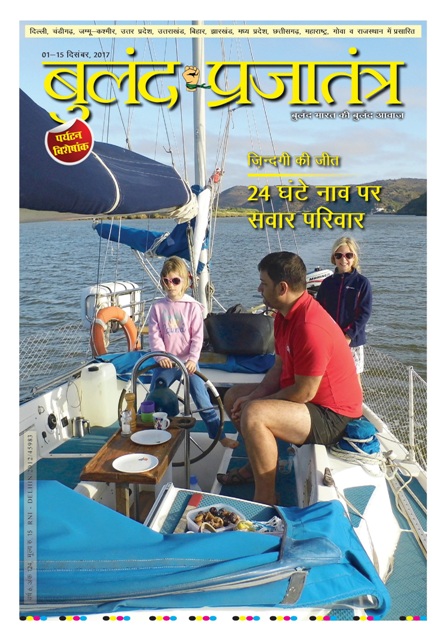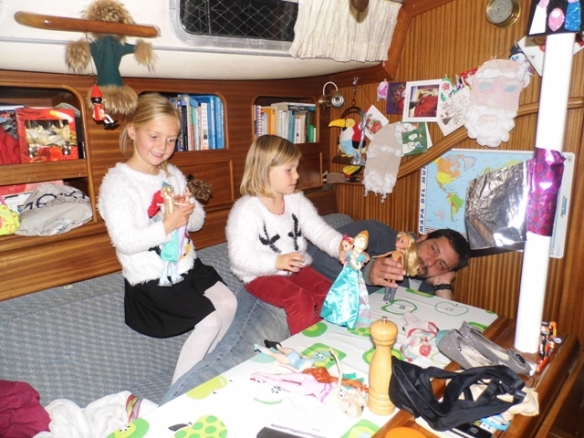Recently, someone with our best interests at heart suggested that our lives would be easier if Julian and I had permanent jobs. These would provide us with financial security, give us something on which to focus our attention, and provide structure to our lives. We could still have a boat, save up our holidays and go sailing in the summer. This put me in a reflective mood and I asked this person for permission to use our conversation as a jumping off point for this blog post.
It’s true that in our current situation we lack financial security. But are we so different to many two-income families? My parents both worked, they were careful with money, and yet money was always a worry. Before we had children, Julian and I had a joint income of £64,000. But it never seemed to be enough. Back then, of course, we knew exactly how much money would appear in our bank account on a certain day each month. We knew the bills would get paid and we didn’t give much thought to how much money we spent on food and going out. These days we don’t know how much money (if any) we will earn in a given month. But I don’t think it has made our financial worries any greater. Rather, our financial worries are different. We no longer have the expense of running a car, paying rent or a mortgage, and paying electricity, telephone and water bills. We have other expenses, but they don’t even compare to our expenses when we lived on land.
These days we have to work hard to make our meagre financial resources stretch far. Some might think it burdensome to spend so much time comparing the prices on tins of tomatoes or weighing up the cost of a night spent at a marina versus the cost of motoring to an anchorage when there’s no wind by which to sail. But this is our work. These minute considerations allow us to live this incredible sailing life. If I wasn’t pondering tins of tomatoes I’d be giving essay-writing advice to a 19-year old undergrad. It’s just a different form of work.
Our way of life requires careful thought, planning and frugality and the replacement of time-saving devices and methods with manual and time-consuming labour. But without permanent full-time jobs, time is on our side and currently we undertake these boat maintenance and household chores in the warm January sun of the Costa del Sol, the beach a two-minute walk from Carina, a hulking orange mountain dominating the skyline behind us. We can leave when we wish and sail to wherever we choose, making anywhere our home. It feels like a pretty good life to me.
But having had this conversation about the benefits of permanent employment, I pondered the alternative to the life we currently live. Of course Julian and I could be in full-time permanent employment. There’s nothing to stop us. Academia is what I know and love and Julian has the research skills and experience to work in academia or in the private or public sectors. I certainly wouldn’t want a permanent job doing anything other than academic Human Geography/Anthropology. Why should I? It’s what I’m trained for. The academic life is a wonderful one, and I have to admit I miss all those intellectual conversations and debates that serve to fertilise the seeds of imagination. I miss my super-smart friends and colleagues, the opportunities for travel, the visits to the pub. I even miss my students some days!
But let’s imagine a scenario – based on my own experiences and on those of friends in academia. There is a side to academic life that makes the family life I desire almost impossible to achieve. Academic couples are frequently forced to live far from each other – in different cities, countries and even continents – as finding two jobs in the same university or city is often an unattainable dream. Julian and I lived apart when I lectured at Reading. In fact, all throughout my pregnancy with Lily, Julian lived in our home in Cambridge (where he worked) and I spent four nights a week in a flat in Reading (where I worked). My friends Tina and Ben have spent the past three years living apart in a foreign country and have only recently found university jobs in the same city in Tina’s native Canada. I have known couples who work in opposite ends of the UK, in different European countries and, in the most extreme example, a friend who worked in Fairbanks, Alaska, and lived there with her baby son, while her husband worked and lived in Vienna, Austria. Eventually, one of them had to give in and put their career on hold. In every university I have been associated with I have known couples who have been forced to live apart in order for both people to pursue their academic careers.
One of the reasons I quit my job at University of Reading after Lily was born was that we simply couldn’t figure out how to make it work. It’s a three and a half hour motorway journey between Cambridge and Reading. If we chose to live somewhere in between, Julian and I would both face up to four hours of commuting by car each day. House prices that close to London were way out of our reach and, if we factored in the cost of 12 hours of child care every day, one of our salaries would completely disappear in commuting and child care costs. Never mind how little time we would spend with each other or with our baby daughter. If you have ever been to Cambridge and Reading, you’ll understand why we chose Cambridge.
But let’s imagine that we were lucky enough to both find work in the same city. The academic workload is mindboggling. There are lectures to write and present, academic and pastoral tutorials, essays to grade, exams to mark, post-graduate students to supervise; departmental administrative duties; research grants to write and, if successful, to manage; journal articles, book chapters and books to write; editorial boards to sit on; external and internal examiner duties to fulfil; conferences to attend; research to plan and carry out; public or private sector consultation or collaboration; and much more besides. (I know as soon as I post this blog, I’ll think of ten more common tasks that I’ve forgotten to mention). I’ve rarely met an academic who doesn’t take their work on vacation. And, despite the misconceptions of non-academics, academics (in the UK) have only 30 days of paid leave a year, not the four months of freedom enjoyed by their students. Many academics don’t even take their 30 days. The long summer is a time to prepare for the next academic year, carry out research and write write write, because that old academic adage ‘publish or perish’ really holds true.
It is a privileged life, spending your days in a safe and comfortable environment, devoting your time to the research questions about which you are wildly passionate. And if I was single or had no children, I think I would throw myself heart and soul into it.
So, let’s take this scenario a little further. Julian and I have found incredible academic jobs in the same city and we are fully engrossed in what we do. In order to do our jobs to the best of our abilities and to progress up the promotional ladder, we would need to work long long hours, and so would need help with raising the kids. Pre-school, a large portion of our salaries would go on child care, and once the girls were in school (as early as possible, to reduce child care costs) they would still need after school care. We would see them briefly, morning and evening, all of us tired and frazzled.
Having the left-over financial resources to own a boat, keep it in good condition, and pay marina fees would be beyond us. Our dreams of a month or two at sea would remain just that and if we were lucky we might manage a week here or there.
But Julian and I chose other priorities. Home educating our children and exploring the world with them quickly became a priority for us. So for the past four years we have chosen a middle path. For three years I took temporary academic contracts that had set working hours. I worked professionally for those 35 hours every week, but I didn’t kill myself working every night and weekend as I used to do before. And this winter I’ve found a job teaching English 18 hours each week. It lacks the intellectual stimulation of university life, but it challenges me in other ways.
Despite not having full-time jobs, our lives have purpose and focus. Short, medium and long-term planning focus our thoughts, as we find innovative ways to make our finances stretch far, plan where we want to sail in a given week or month, and think about where we want to be in five or ten years time. We are focused on raising and educating the children – something that requires a lot of energy and innovation. And both Julian and I passionately pursue our own interests. While I have immediate and decade-long plans for my writing. Julian’s approach to planning is different, but this winter his obsession has been studying Spanish.
What we lack in financial security we more than make up for with the time and space to be innovative in our approach to living. And we have time to play, learn and grow together. No-one’s path through life runs smooth all the time, and each choice made means that other choices have to be cast aside. But at 40 and 41 years old, Julian and I have made our choices based on our past experiences, and based on what we know works for us as individuals and as a family.
Live an enthusiastic life, whatever path you choose.








